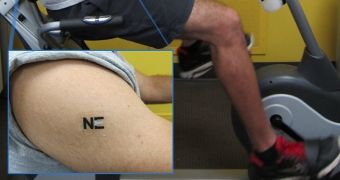There seems to be a lot of research being put into batteries and alternatives to them, or at least current methods of building the things. The American Chemical Society appears to be especially active in this area right now.
We've just finished looking into cannabis-based batteries. Well, batteries based on hemp anyway, which is the word used to refer to all the legal applications of cannabis plants (foodstuffs, clothing, ropes, various other industrial things, etc.).
As it turns out, however, that is just one new type of battery proposed by the American Chemical Society. They have also come up with battery tattoos, of all things.
ACS researchers have developed a temporary tattoo that not only monitors a person's progress during an exercise, but can produce power from the sweat they work up. It's one of the more ingenious ways of using “wasted” energy resulting from bodily motion, if we do say so ourselves.
The tattoo fist detects the presence of lactate, a chemical naturally present in perspiration and a very good indicator of how much your current exercise routine is helping your health.
The more intense the exercise, the more lactate is produced. If you push things beyond what the body is used to, it will activate a process called glycoysis, which produces energy and lactate.
Lactate can already be detected in the blood, but the process is rather intrusive, since it needs blood samples to be collected. Not something appreciated overmuch by professional athletes, who need to monitor their lactate levels during a performance testing.
The new sensor picks it up in sweat now, and it's not just athletes it will help. High lactate levels can be unhealthy, you see, causing heart or lung disease, and the temporary tattoo sensors will be able to tell easily if the body already has too high a concentration.
The team that developed the lactate sensor / battery charger / lactate detector tattoo was led by Wenzhao Jia, Ph.D., a postdoctoral student in the lab of Joseph Wang, D.Sc., at the University of California San Diego.
The flexible lactate sensor imprinted on a temporary tattoo paper has an enzyme that strips electrons from lactate, generating a weak electrical current. 15 healthy volunteers applied it to their upper arms and exercised on a stationary bike.
The less fit ones produced more power, as they work up a sweat faster due to the glycolisis process starting earlier (they tire much more easily). The best power generated by the volunteers was of 70 microWatts per square cm of skin. It's still way too little to be used for anything (smartwatches, headsets, smartphones), but time will only bring improvements.

 14 DAY TRIAL //
14 DAY TRIAL // 